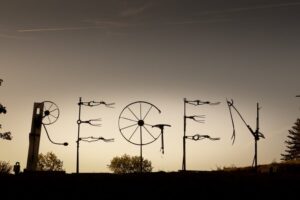The National Trust for Jersey Media Release
30th November 2015
Continued Restoration at Plémont – Tree Planting
IT’S a year since the demolition of the former holiday camp began and Plémont Headland has transformed from a dilapidated eyesore to a green open space. The next stage of the site’s transformation is to plant a range of trees.
The tree planting started on Thursday 3 December with Les Landes School Year 5 group, who helped the National Trust Lands team start the huge task planting the shrubs and trees.
The plants consisted of tree species such as Scots Pine and Field Maple as well as many low lying shrubs including Broom, Gorse, Elder, Hawthorn and Blackthorn.
The choice of species and the reason why standard trees are not being used is due to the habitat at Plémont, which is extremely exposed, windy and very cold during the winter months. The site is therefore much more suited to shorter species like hawthorn and Blackthorn which, while still taking time to establish, will form dense thickets and hedges which provide food, in the form of berries, shelter from the harsh conditions and even nesting opportunities for birds and other animal species.
The planting scheme was devised by Michael Felton (Landscape designer) and has been designed to help establish natural heathland and maritime grassland communities by forming sheltered niches particularly by plants like Gorse and broom which are already found in the existing vegetation in and around the site whilst maintaining the open character of the headlands.
Jon Parkes, the Trust’s lands manager, said: ‘The idea behind the planting scheme is not to create a semi natural garden, but apply a minimalistic approach which will facilitate the restoration of the site into an open grassland or heathland like it once was. This will also provide cover, food and network corridors in the short term for wildlife such as the toads, green lizards, slow worms, small mammals and many birds which are already moving onto the site.
The planting consists of around 1,900 trees and shrubs, which must be planted in winter whilst they are in their dormant stage.
The remaining plants will be planted with help from the Jersey Conservation Volunteers, the ‘Back to Work’ scheme and The National Trust for Jersey Rangers.




